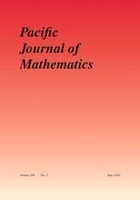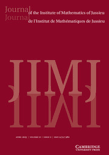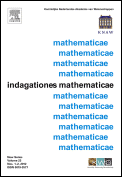
PACIFIC JOURNAL OF MATHEMATICS
Scope & Guideline
Empowering the Mathematical Community with Quality Research
Introduction
Aims and Scopes
- Algebra and Number Theory:
This area encompasses research on algebraic structures, number theoretic properties, and their applications. Topics include representations, algebraic varieties, and various algebraic systems. - Geometry and Topology:
Research in this scope includes differential geometry, algebraic geometry, and topology. The focus is on understanding the properties and structures of geometric objects and their relationships. - Analysis:
The journal publishes papers on various branches of analysis, including functional analysis, real analysis, and complex analysis. This includes studies on operator theory, measure theory, and other analytical methods. - Mathematical Physics:
This area addresses the intersection of mathematics and physics, focusing on mathematical theories and models that describe physical phenomena. Topics include quantum mechanics, relativity, and statistical mechanics. - Combinatorics and Discrete Mathematics:
Research in this domain involves combinatorial structures, graph theory, and discrete optimization. It explores counting methods, arrangements, and configurations in discrete settings. - Applied Mathematics:
This includes the application of mathematical techniques to solve real-world problems in various fields such as engineering, biology, and economics. It emphasizes modeling, simulation, and numerical analysis.
Trending and Emerging
- Quantum Algebra and Quantum Groups:
There is a significant increase in research related to quantum algebra and quantum groups, highlighting the growing interest in non-classical algebraic structures and their applications in theoretical physics. - Data Science and Mathematical Modeling:
Emerging themes in data science and mathematical modeling have gained traction, with many papers exploring statistical methods, machine learning approaches, and their mathematical foundations. - Topology and Geometric Analysis:
Recent issues have featured a surge in papers on topology and geometric analysis, indicating a revitalization of interest in these interconnected areas, particularly in relation to manifolds and their properties. - Nonlinear Partial Differential Equations:
The study of nonlinear partial differential equations is increasingly prominent, reflecting the ongoing interest in their applications in various scientific fields and the development of new analytical techniques. - Algebraic Geometry and Its Applications:
An emerging trend is the application of algebraic geometry to solve problems in other mathematical domains, including number theory and cryptography, indicating an interdisciplinary approach.
Declining or Waning
- Classical Mechanics and Dynamical Systems:
Research related to classical mechanics and dynamical systems appears to be waning, with fewer papers addressing these traditional topics in recent issues. - Elementary Number Theory:
While still a foundational area, the frequency of publications focusing solely on elementary number theory has decreased, indicating a shift towards more complex and abstract mathematical structures. - Traditional Mathematical Education:
There has been a noticeable decline in papers addressing traditional mathematical pedagogy and educational methods, suggesting a move towards research that emphasizes innovative teaching practices or technology integration.
Similar Journals

Pure and Applied Mathematics Quarterly
Shaping the Future of Mathematics with Every IssuePure and Applied Mathematics Quarterly is a prestigious journal published by INT PRESS BOSTON, INC, focusing on the diverse and evolving field of mathematics. Since its inception in 2007, this journal has grown significantly, currently holding a Q1 ranking in the Mathematics (Miscellaneous) category for 2023, positioning it among the leading publications in the discipline. With a commitment to publishing high-quality research, Pure and Applied Mathematics Quarterly fosters innovation and dialogue within the mathematical community by providing a platform for theoretical advancements and practical applications. The journal remains accessible to researchers and professionals through its ISSN 1558-8599 and E-ISSN 1558-8602, although it does not currently offer open access. As a vital resource for mathematicians, educators, and students, this journal endeavors to expand the frontiers of mathematical knowledge and contribute to the academic dialogue surrounding this fundamental science.

Bulletin Mathematique de la Societe des Sciences Mathematiques de Roumanie
Empowering Researchers with Rigorous Mathematical InsightsThe Bulletin Mathematique de la Societe des Sciences Mathematiques de Roumanie, published by SOC MATEMATICE ROMANIA, is a distinguished platform dedicated to the dissemination of advanced mathematical research and developments. With ISSN 1220-3874 and E-ISSN 2065-0264, this journal serves the global mathematical community, particularly in Romania, fostering collaboration and innovation in varied mathematical disciplines. Despite being categorized in the Q3 quartile of the *Mathematics (miscellaneous)* field and holding a Scopus rank placing it in the 19th percentile, the journal remains committed to publishing high-quality articles that explore theoretical and applied mathematics. Running from 2008 to 2024, it aims to encourage the sharing of knowledge and advancements within both academic and practical domains, affirming its importance as a valuable resource for researchers, professionals, and students alike. Although the journal does not currently offer open access, it contributes to the mathematical discourse through the rigorous selection of papers that adhere to high scholarly standards.

Research in the Mathematical Sciences
Advancing Knowledge in Mathematical DisciplinesResearch in the Mathematical Sciences is a prestigious journal published by Springer International Publishing AG, specializing in a diverse range of mathematical disciplines. With an ISSN of 2522-0144 and an E-ISSN of 2197-9847, this journal operates out of Switzerland and has established a reputation for excellence in research dissemination since its inception in 2014. The journal is currently ranked in the highly regarded Q2 quartile for Applied Mathematics, Computational Mathematics, and Mathematics (miscellaneous), along with a Q3 rank in Theoretical Computer Science, reflecting its substantial influence within the academic community. Researchers will find great value in this journal as it features high-quality, peer-reviewed articles that contribute to the advancement of mathematical sciences. The journal promotes open access options, facilitating greater accessibility to innovative research findings. With its comprehensive scope and strong Scopus rankings, Research in the Mathematical Sciences serves as an essential resource for academics, professionals, and students eager to stay at the forefront of mathematical research and its applications.

Journal of the Institute of Mathematics of Jussieu
Elevating the Standards of Mathematical ScholarshipJournal of the Institute of Mathematics of Jussieu, published by Cambridge University Press, is a leading academic journal that has established itself as a vital resource in the field of mathematics. With an impressive impact factor and a ranking in the top quartile (Q1) of miscellaneous mathematics, the journal serves as a platform for high-quality research from both established scholars and emerging researchers. Spanning from 2002 to 2024, the journal aims to foster collaboration and innovation in the mathematical community by publishing original research articles, reviews, and critical discussions on a wide range of mathematical topics. Although the journal does not offer open access, it remains widely accessible through various academic institutions and libraries, ensuring that critical advancements in mathematics are shared with a global audience. Located in the United Kingdom at the prestigious Cambridge campus, the journal reflects the rigorous standards of its publisher and the rich academic tradition of its home institution.

Mediterranean Journal of Mathematics
Fostering Dialogue and Discovery in Mathematical SciencesThe Mediterranean Journal of Mathematics, published by SPRINGER BASEL AG, is a prominent platform dedicated to the advancement of mathematical research and education. Since its inception in 2004, this journal has been pivotal in disseminating high-quality research across various fields of mathematics, currently holding a notable Q2 ranking in the miscellaneous mathematics category as of 2023. With its ISSN 1660-5446 and E-ISSN 1660-5454, the journal enjoys a respected position in the academic community, evident by its Scopus rank of 129 out of 399 in General Mathematics, placing it in the 67th percentile. While primarily a subscription-based journal, it remains committed to providing a comprehensive resource for researchers, professionals, and students, fostering dialogue and exploration within the mathematical sciences. The Mediterranean Journal of Mathematics, based in Basel, Switzerland, continues to contribute significantly to the evolution of mathematical theory and practice, marking its relevance as we approach its 20th anniversary in 2024.

Revista de la Real Academia de Ciencias Exactas Fisicas y Naturales Serie A-Matematicas
Connecting Scholars through Cutting-edge Mathematical ResearchRevista de la Real Academia de Ciencias Exactas Fisicas y Naturales Serie A-Matematicas, published by SPRINGER-VERLAG ITALIA SRL, is a premier academic journal based in Italy that serves as a significant platform for researchers and practitioners in the fields of Mathematics. With a focus on core areas such as Algebra, Analysis, Applied Mathematics, Computational Mathematics, and Geometry and Topology, this journal boasts an impressive performance in academic rankings, achieving Q1 status in multiple categories, reflecting its excellence in disseminating high-quality research. The journal is easily accessible through subscription options and provides a vital resource for the mathematics community, fostering the exploration of innovative ideas and methodologies. The journal’s commitment to advancing mathematical knowledge is evident through its competitive Scopus rankings, including a remarkable rank of #1 in Algebra and Number Theory, placing it in the top percentile of its field. Scholars and students alike will find in this publication a rich source of impactful research that not only contributes to the academic discourse but also enhances the practical applications of mathematics in today's society.

Acta Mathematica Vietnamica
Charting New Territories in Mathematical SciencesActa Mathematica Vietnamica is a reputable journal in the field of mathematics, published by Springer Singapore Pte Ltd. With an ISSN of 0251-4184 and an E-ISSN of 2315-4144, this journal has been a significant platform for disseminating research findings and advancements in mathematical theories and applications since its inception. It currently holds a Q3 ranking in Mathematics (miscellaneous) for the year 2023, reflecting its growing influence within the academic community. Despite being based in Singapore, Acta Mathematica Vietnamica resonates globally, attracting contributions from researchers and professionals worldwide. While the journal operates under a subscription model, it offers robust access options, ensuring that critical research is accessible to a diverse audience. Researchers and students will find invaluable insights within its pages, facilitating a deeper understanding and exploration of advanced mathematical concepts. As it continues to converge from 2011 to 2024, this journal remains dedicated to fostering innovation and collaboration in the mathematical sciences.

INDAGATIONES MATHEMATICAE-NEW SERIES
Exploring the depths of theory and application in mathematics.INDAGATIONES MATHEMATICAE-NEW SERIES is a distinguished academic journal specializing in the field of mathematics, with a focus on both theoretical and applied aspects of the discipline. Published by Elsevier, a leading publisher in the scientific community, this journal has established itself as a crucial platform for the dissemination of high-quality research. With an ISSN of 0019-3577 and an E-ISSN of 1872-6100, it operates out of the Netherlands and has been a vital resource for academics since its inception in 1969. Currently, it holds a Q2 ranking in the mathematics category, signifying its relevance and impact in the field, with a Scopus rank of #222 out of 399 in General Mathematics, placing it in the 44th percentile. Although it does not currently offer Open Access options, INDAGATIONES MATHEMATICAE-NEW SERIES is committed to contributing to the advancement of mathematics by publishing original research articles, reviews, and notes that enrich the academic community. Researchers, students, and professionals alike will find invaluable insights and developments within its pages, making it a cornerstone journal for those keen on exploring the complexities of mathematics.

European Journal of Pure and Applied Mathematics
Pioneering New Paths in Algebra, Geometry, and BeyondThe European Journal of Pure and Applied Mathematics, published by NEW YORK BUSINESS GLOBAL LLC, stands as a pivotal platform in the mathematical sciences, fostering the dissemination of significant research across various domains including algebra, applied mathematics, geometry, and theoretical computer science. Since embracing Open Access publishing in 2011, the journal enables unparalleled access to innovative findings and methodologies, making it an invaluable resource for researchers, professionals, and students alike. With a commendable Scopus ranking and a demonstrated impact within its categories—holding a Q3 position in several mathematical disciplines—the journal reflects a commitment to advancing knowledge and facilitating scholarly dialogue.

Analele Stiintifice ale Universitatii Ovidius Constanta-Seria Matematica
Advancing Mathematical Frontiers with Open Access InsightAnalele Stiintifice ale Universitatii Ovidius Constanta-Seria Matematica is a prominent open-access journal established by OVIDIUS UNIV PRESS in Romania, dedicated to advancing the fields of mathematics, specifically in Analysis and Applied Mathematics. Since its inception, the journal has emphasized the dissemination of high-quality research, making it accessible to a global audience. With an ISSN of 1224-1784 and E-ISSN 1844-0835, it has positioned itself within the academic community, achieving a respectable Q3 ranking in both analysis and applied mathematics in 2023, reflecting its commitment to rigorous scholarship. The journal spans a considerable publication window from 2009 to 2024, catering to the ongoing developments in mathematical sciences and their applications. Researchers, professionals, and students alike will find valuable insights and contributions that enrich their understanding and foster collaboration within the mathematical community. The journal's headquarters is based at the Faculty of Mathematics & Computer Science, Bulevardul Mamaia 124, Constanta, Romania.